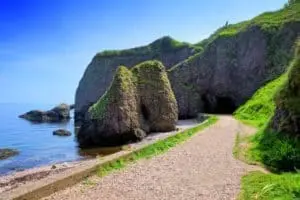Exploring the Ancient Sea Gods: Mythology, Legends, and Powers

Updated On: April 14, 2024 by Dina Essawy
Venturing into the enigmatic realm of ancient sea gods is certainly an intriguing pursuit, yet one that’s fraught with intricacies. I can just picture you, like myself, being drawn down this fantastical rabbit hole of mythology only to emerge brimming with curiosity – who exactly were these aquatic deities? One element that seized my imagination was Poseidon’s rulership not merely over the seas but also on earthquakes and horses! Through this article, we shall voyage through time to unearth legends surrounding such potent deities hailing from Greek to Egyptian civilisations and decipher their prevalent powers.
Are you prepared for a mythological deep dive steeped in mystery?
An Exploration of the Ancient Sea Gods
In this section, we will delve into the captivating world of ancient sea gods from different mythologies and explore their fascinating powers and legends.
Greek Gods of Water and the Sea
In Greek tales, we find gods who rule the sea and water. Poseidon is one of these gods. He is a strong god in Greek myths. He rules more than just the sea. In fact, he also has power over all water, earthquakes, and horses! Not many people know this about Poseidon.
There are other gods of the sea, too, in Greek stories. We have Amphitrite, Triton, Nereids, Thetis, Nereus and more! All these gods each have their own powers and stories to tell.
Knowing about these water and sea deities gives us clues into ancient Greek life. It helps us understand what they thought was important back then. So if you’re on a trip or just curious about old legends like I am – dive deep into tales of Greek sea gods!
Hindu Water Gods
In Hindu mythology, water gods hold a significant place. One of the most important Hindu water gods is Varuna, who is considered to be the guardian of cosmic order and morality. He is often depicted as riding on a fish or a creature that resembles a crocodile.
Another prominent water god in Hinduism is Ganga, the goddess of the sacred river Ganges. She is revered for her purifying qualities and worshipped by millions who believe that bathing in her waters will cleanse their sins.
These ancient stories and beliefs surrounding Hindu water gods offer insights into the cultural and religious practices of ancient India, making it an intriguing topic for history buffs and adventurers alike.
Egyptian Water Gods
In ancient Egypt, water gods played a vital role in their mythology and culture. One of the most prominent Egyptian water gods was Hapi, associated with the Nile River. Egyptians believed that Hapi controlled the annual flooding of the Nile, which brought fertility to their land.
Another important water deity was Sobek, depicted as a crocodile-headed god who represented power and protection. The goddess Tefnut embodied moisture and rain, while her husband Shu symbolized dryness and air.
Together, they maintained balance in nature. These fascinating Egyptian water gods provide us insights into how ancient Egyptians revered and relied on these deities for their agricultural prosperity and natural harmony with the environment.
Powers and Legends of Sea Gods
Poseidon, the powerful Greek god of the sea, is known for his ability to cause earthquakes and control the tides with a swing of his trident.
Poseidon, God of the Sea
Poseidon, the mighty god of the sea in ancient Greek mythology, holds immense power and significance. As a ruler of the ocean, he controlled not only its waves but also had dominion over earthquakes and horses.
Poseidon was known for his moody temperament and played a crucial role in many famous myths and legends. He was often associated with Neptune, the Roman god of water, showcasing his influence beyond Greece.
Whether you’re a history buff or simply fascinated by ancient tales, delving into the stories surrounding Poseidon will provide you with a deeper understanding of Greek culture and mythology.
Anuket, Goddess of the Nile
Anuket, the Goddess of the Nile, was an important figure in Egyptian mythology. She was often depicted as a woman wearing a crown with ostrich feathers, symbolizing her association with fertility and abundance.
As the goddess of the Nile, Anuket was believed to bring life-giving water to Egypt during its annual flooding.
Ancient Egyptians relied on the annual flood of the Nile for their survival and prosperity. They believed that it was Anuket who controlled these floods and ensured that they were neither too destructive nor too weak.
This made her a highly revered deity among both common people and pharaohs.
In addition to her role in controlling the floods, Anuket had other attributes associated with water. She was also considered a protector of travellers on boats and those who worked alongside or traded on the river.
Chac, Mayan God of Rain
Chac, the Mayan God of Rain, played a vital role in ancient Mayan culture. As the god responsible for rainfall and agriculture, he was worshipped by farmers who relied on his blessings for successful harvests.
Chac was often depicted with reptilian features and a long nose which represented lightning and rain clouds. He controlled the rains that brought water to nourish the crops, ensuring their growth and abundance.
The Mayans believed that without Chac’s intervention, droughts would occur, leading to failed harvests and famine. His importance in Mayan society shows how crucial rain was for their survival as an agricultural civilization.
Conclusion
In conclusion, exploring the ancient sea gods reveals a fascinating world of mythology, legends, and powers. From Poseidon’s control over the seas to Anuket’s influence on the Nile, these deities held great significance in various cultures.
By understanding their stories and abilities, we can gain valuable insights into ancient civilizations and their beliefs about the power of water.
FAQs
1. What are some ancient water deities known in mythology?
Ancient myths speak of various water deities, including the moody Olympian sea gods, Norse water gods and underwater Egyptian divinities.
2. Who are some famous ocean creatures from ancient tales?
In tales of maritime divinities, there are mentions of mythological sea creatures like Greek sea nymphs and supernatural beings of the sea.
3. Can you tell more about King-like figures among these aquatic spirits?
Most lore surrounding marine gods includes King-like figures such as Roman Sea Gods who held immense power in their mythical world.
4. Did these ancient gods have special powers linked to water?
Yes, indeed! Ancient gods and goddesses related to water often had unique mythological powers over the ocean, which were significant in many age-old stories.
5. How is this theme present in folklore and legends?
Sea legends and folklore extensively feature both the moodiest ocean deities as well as gentle water nymphs with intricate stories that explore their powers.






